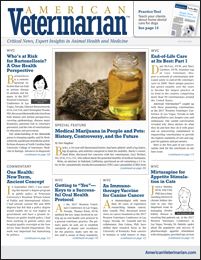Making One Health a Priority
Although we haven’t had a pandemic in quite some time, the Ebola and Zika outbreaks serve as examples of what can happen when a dangerous pathogen becomes easily transmissible.
Although we haven’t had a pandemic in quite some time, the Ebola and Zika outbreaks serve as examples of what can happen when a dangerous pathogen becomes easily transmissible. This is why many epidemiologists are watching out for the next “big one”—on the scale of the 1918 flu outbreak.
Although Ebola and Zika are no longer considered public health emergencies by the World Health Organization, other potentially deadly disease loom—and many of them are spread by animals to people.
Are public health agencies as ready as they should be for a zoonotic pandemic? The short answer is no: When it comes to major disease outbreaks of any kind, we can’t be overprepared. Investigative journalist Sonia Shah, author of Pandemic: Tracking Contagions from Cholera to Ebola and Beyond, cited a survey that revealed many experts believe that some time in the next 20 years a pandemic will occur that will “sicken a billion people, kill 165 million people, and cost the global economy about $3 trillion.” Indeed, a 2015 outbreak of avian flu killed 48 million birds and had an economic toll of $3 billion; the health and monetary effects of an outbreak on this scale in humans would be monumental.
Veterinarians are vitally important in the battle against zoonotic diseases. Epidemiologists, physicians, and other human health experts can’t do it alone. That’s why the concept of One Health—that achieving optimal health for people, animals, and the environment requires the collaboration of professionals from multiple health and medical disciplines—has never been more important.
In our ongoing effort to infuse One Health information throughout American VeterinarianTM, this issue includes multiple topics that affect both people and animals. A commentary from Laura H. Kahn, MD, MPH, MPP, a physician and research scholar with the Program on Science and Global Security at the Woodrow Wilson School of Public and International Affairs at Princeton University, details her journey to discovering the importance of DVM—MD collaboration and what led her to take the next step in founding the One Health Initiative.
We also report on a lecture given at the Western Veterinary Conference by Edward Breitschwerdt, DVM, DACVIM, and Christopher Woods, MD, infectious disease specialists in veterinary and human medicine, respectively. They reported on Bartonellosis, a zoonotic disease that can have serious consequences in both people and animals.
This and other diseases threaten both human and animal health, and as the risk for a zoonotic pandemic grows, veterinarians and medical doctors must work together to develop programs that protect animals and people. 
Thank you for reading.
Mike Hennessy, Sr
Chairman and CEO
